| William Shanks was born about 1895.
|
| Contrary information gives William’s place of birth as either the Shankhill in Belfast (Ireland’s Memorial Records) or in County Derry (census).
|
| The 1911 census lists Willie as age 16, living with his grandmother at house 12 in Castledawson. He had left school and was working as a power loom weaver.
|
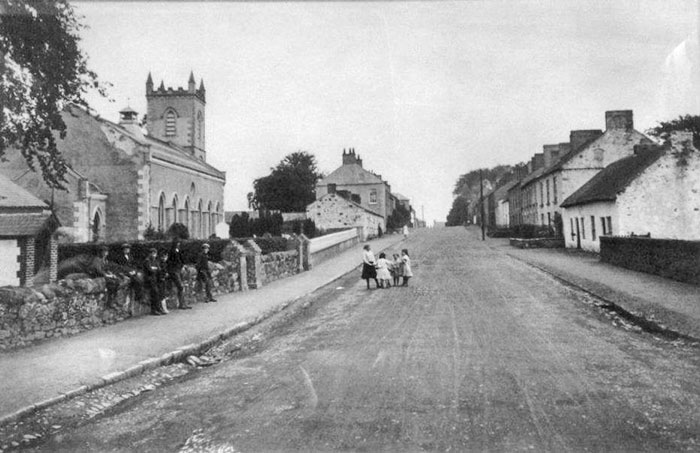
|
| Few towns have more nobly responded to the call of the Empire than the historic village on the banks of the Moyola. When Castledawson Ulster Volunteers echoed the words of their great leader that they wanted to remain in the Empire because, if necessary, they were prepared to die that Empire, theirs’ were no empty words. That they meant what they said had been shown by their action in sending a second contribution to join their twenty five companions already in Finner Camp. These men left on Monday, and after being presented with comforts and other gifts, were accompanied to the station by cheering crowds. The little band of four consisted of William Shanks and Alex Leslie, youths of the party, John Hawe, the third married man to leave Castledawson, and Charleton McNally, the veteran of the party, a widower and a grandfather, who already has two married sons somewhere in the trenches of France, and whose grandsons are sufficiently old to feel pride in their grandfather’s action. Few, not already acquainted with him, would have guessed that the possessor of that firm, well set-up boyish figure marching so blithely to the station, had served sixteen years in the Londonderry Garrison Artillery and that that service had begun as long ago as 1885. ‘There’s not a better man than ‘Chat’ in Finner Camp’ was the consensus of opinion. The veteran himself was confident of his own ability to do his share of whatever duty arose, for as he took farewell of his friends on the platform he said ‘I only hope that I may have an opportunity of joining my tweo lads at the front, and if we three get together we will show some of these Germans the stuff that McNallys are made of.’
|
| William Shanks enlisted in Castledawson.
|
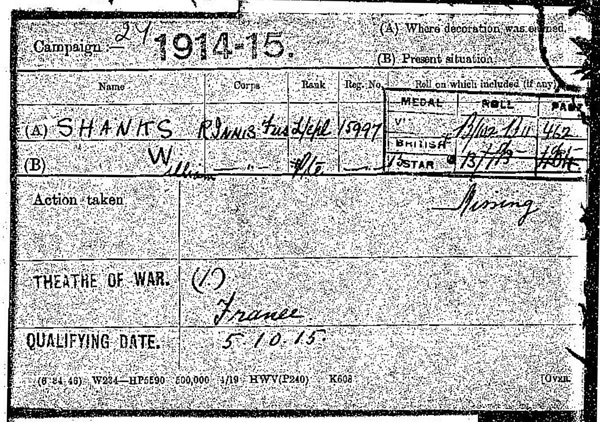
|
| From the Mid Ulster Mail dated 17th October 1914: Castledawson Grandfather for Kitchener’s Army
|
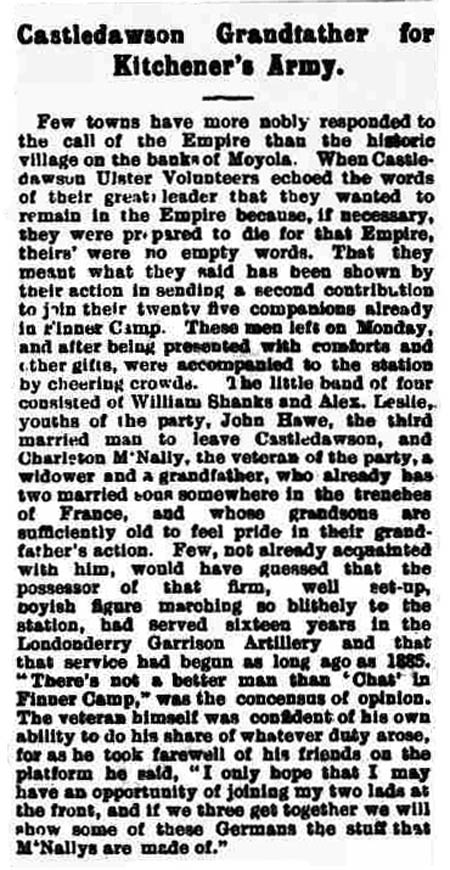
|
| From the Mid Ulster Mail dated 12th June 1915: Castledawson
|
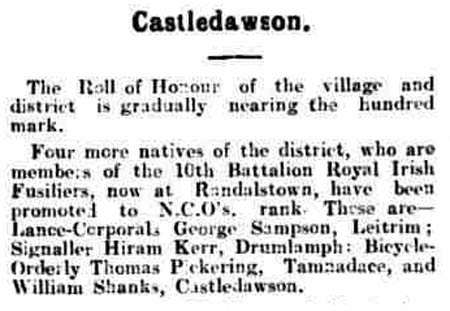
|
| The Roll of Honour in the village and district is gradually nearing the hundred mark. Four more natives of the district, who are members of the 10th Battalion Royal Irish Fusiliers, now at Randalstown, have been promoted to non-commissioned officers (NCO) rank. These are:- Lance Corporals George Sampson, Leitrim; Signaller Hiram Kerr, Drumlamph; Bicycle Orderly Thomas Pickering, Tamnadace; and William Shanks, Castledawson.
|
| From the Belfast Newsletter dated 4th December 1915:
|

|
| Lance Corporal William Shanks, 10th Royal Inniskilling Fusiliers (Derry Volunteers), who was accidentally injured during trench digging in France, writes to his home in Castledawson that he is now out of hospital.
|
| From the Mid Ulster Mail dated 4th December 1915:
|
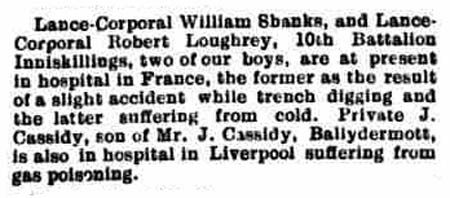
|
| Lance Corporal William Shanks, and Lance Corporal Robert Loughrey, 10th Battalion Inniskillings, two of our boys, are at present in hospital in France, the former as the result of a slight accident while trench digging and the latter suffering from the cold. Private J Cassidy, Ballydermott, is also in hospital in Liverpool suffering from gas poisoning.
|
| A newspaper report from November 1916 records that Lance Corporal Shanks had been gassed and was at home on leave after thirteen months at the front.
|
| From the Mid Ulster Mail dated Saturday 25 November 1916: Castledawson
|

|
| Lance Corporal William Shanks and signaller Hiram Kerr, 10th Inniskillings, both of whom were gassed, are at present on home leave after thirteen months fighting.
|
| Lance Corporal William Shanks was awarded the Military Medal (M.M.).
|
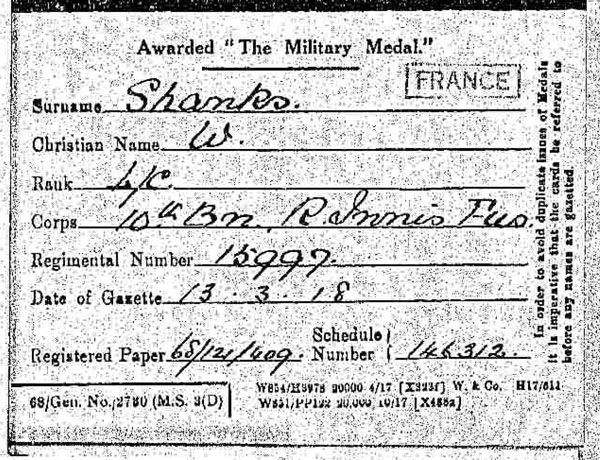
|
| From the Belfast Newsletter dated 12th January 1918:
|

|
| Lance Corporal William Shanks and Private Jack Harte, of Castledawson, have been awarded the Military Medal. They belong to the Royal Inniskilling Fusiliers.
|
| From the Mid Ulster Mail dated 2nd March 1918: Castledawson
|
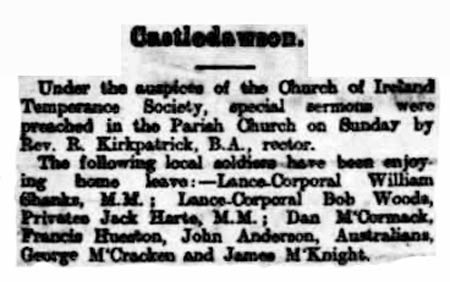
|
| The following soldiers have been enjoying home leave:- Lance Corporal William Shanks, M.M.; Lance Corporal Bob Woods; Private Jack Harte, M.M.; Dan McCormack, Francis Hueston, John Anderson, Australians; George McCracken and James McKnight.
|
| From the Mid Ulster Mail dated 2nd March 1918: South Derry Heroes – How They Won Military Crosses
|
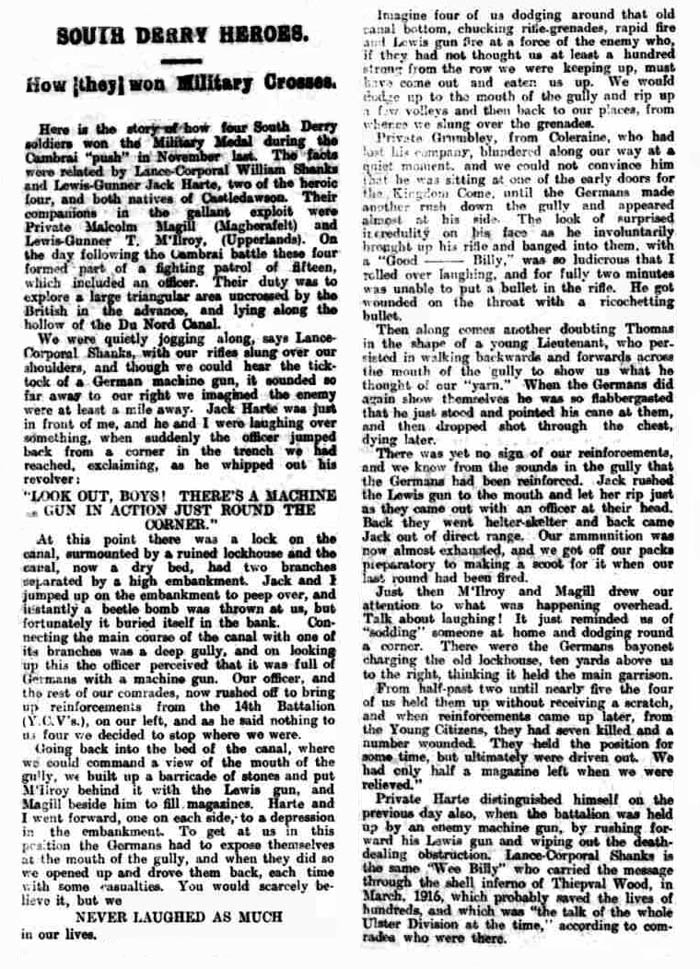
|
| Here is the story of how four South Derry soldiers won the Military Medal during the Cambrai push in November last. The facts were related by Lance Corporal William Shanks and Lewis Gunner Jack Harte, two of the heroic four, and both natives of Castledawson. Their companions in the gallant exploit were Private Malcolm Magill (Magherafelt) and Lewis Gunner T McIlroy (Upperlands). On the day following the Cambrai battle these for formed part of a fighting patrol of fifteen, which included an officer. Their duty was to explore a large triangular area uncrossed by the British in the advance, and lying along the hollow of the Du Nord Canal.
|
| We were quietly jogging along, says Lance corporal Shanks, with our rifles slung over our shoulders, and though we could hear the tick-tock of a German machine gun, it sounded so far away to our right we imagined the enemy were at least a mile away. Jack Harte was just in front of me, and he and I were laughing over something, when suddenly the officer jumped back from a corner in a trench we had reached, exclaiming as he ripped out his revolver:- ‘Look out boys! There’s a machine gun in action just around the corner.’
|
| At this point there was a lock on the canal; surmounted by a ruined lock house and the canal, now a dry bed, had two branches separated by a high embankment. Jack and I jumped up on the embankment to peep over, and instantly a beetle bomb was thrown at us, but fortunately it buried itself in the bank. Connecting the main course of the canal with one of its branches was a deep gully and on looking up this, the officer perceived that it was full of Germans with a machine gun. Our officer, and the rest of our comrades, now rushed off to bring up reinforcements from the 14th Battalion (Y.C.V.’s) on our left, and as he said nothing to us four, we decided to stop where we were.
|
| Going back into the bed of the canal, where we could command a view of the mouth of the gully, we built up a barricade of stones and put McIlroy behind it with the Lewis gun, and Magill beside him to fill magazines. Harte and I went forward, one on each side, to a depression in the embankment. To get at us in this position, the Germans had to expose themselves at the mouth of the gully, and when they did so we opened up and drove them back, each time with some casualties. You would scarcely believe it, but we never laughed so much in our lives.
|
| Imagine four of us dodging around that old canal bottom, chucking rifle grenades, rapid fire and Lewis gun fire at a force of the enemy who, if they had not thought us at least a hundred strong from the row we were keeping up, must have come out and eaten us up. We would dodge up to the mouth of the gully and rip up a few volleys and then back to our places, from where we slung over the grenades.
|
| Private Grumbley, from Coleraine, who had lost his company, blundered along our way at a quiet moment, and we could not convince him that he was sitting at one of the early doors for the Kingdom Come, until the Germans made another rush down the gully and appeared almost at his side. The look of surprised incredulity on his face as he involuntarily brought up his rifle and banged into them, with a ‘Good ___ Billy’, was so ludicrous that I rolled over laughing, and for fully two minutes was unable to put a bullet in a rifle. He got wounded on the throat with a ricocheting bullet.
|
| Then along came another doubting Thomas in the shape of a young lieutenant, who persisted in walking backwards and forwards across the mouth of the gully to show us what he thought of our ‘yarn’. When the Germans did again show themselves he was so flabbergasted that he should stood and pointed his cane at them and then dropped, shot through the chest, dying later.
|
| There was yet no sign of our reinforcements, and we knew from the sounds in the gully that the Germans had been reinforced. Jack rushed the Lewis gun to the mouth and let her rip just as they came out with an officer at their head. Back they went helter skelter and back came Jack out of direct range. Our ammunition was now almost exhausted, and we got off our packs preparatory to making a scoot for it when our last round had been fired.
|
| Just them McIlroy and Magill drew our attention to what was happening overhead. Talk about laughing! It just reminded us of sodding someone at home and dodging around a corner. There were the Germans bayonet charging the old lock house, ten yards above us to the right, thinking it held the main garrison.
|
| From half past two until nearly five, the four of us held them up without receiving a scratch, and when the reinforcements came up later, from the Young Citizens, they had seven killed and a number wounded. They held the position for some time, but ultimately were driven out. We had only half a magazine left when we were relieved.’
|
| Private Harte distinguished himself on the previous day also, when the battalion was held up by an enemy machine gun, by rushing forward his Lewis gun and wiping out the death dealing obstruction. Lance Corporal Shanks is the same ‘Wee Billy’ who carried the message through the shell inferno of Thiepval Wood in March 1916, which probably saved the lives of hundreds, and which was ‘the talk of the whole Ulster Division at the time’, according to comrades who were there.
|
| Lance Corporal William Shanks was serving with the 2nd Battalion of the Royal Inniskilling Fusiliers when he was killed in action on Thursday 21st Mar 1918 at the commencement of the German Spring Offensive. He was 23 years old.
|
| From the Mid Ulster Mail dated 24th October 1918: Castledawson
|
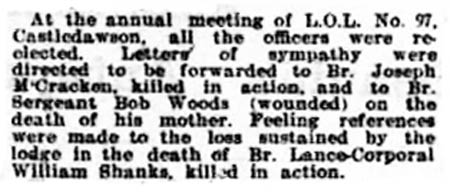
|
| At the annual meeting of L.O.L. No 97, Castledawson, all the officers were re-elected. Letters of sympathy were directed to be forwarded to Brother Joseph McCracken (son) killed in action, and to Brother Sergeant Bob Woods (wounded) on the death of his mother. Feeling references were made to the loss sustained by the lodge in the death of Brother Lance Corporal William Shanks, killed in action.
|
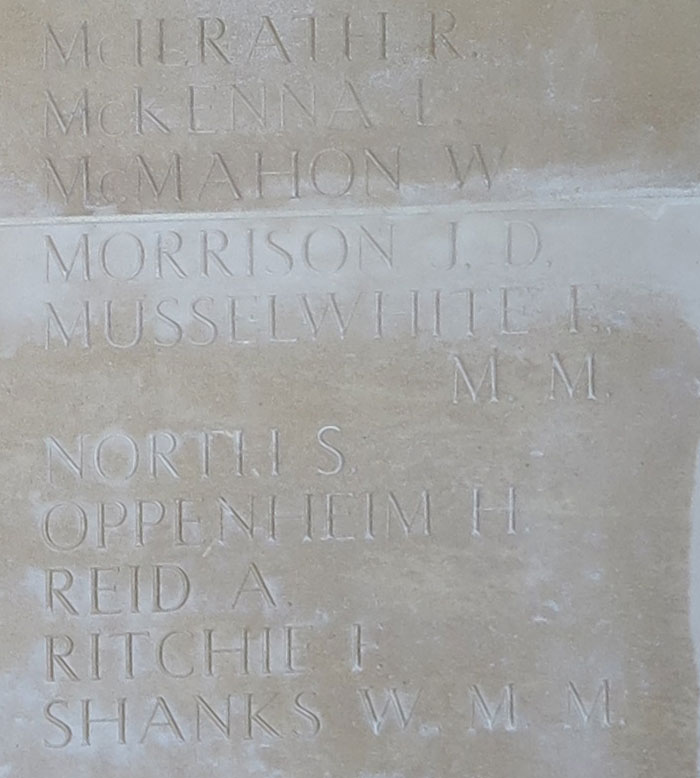
|
| Lance Corporal Shanks has no known grave and is commemorated on the Pozieres Memorial in Picardie, France.
|

|
